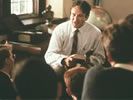Eye For Film >> Movies >> Dead Poets Society (1989) Film Review
From Antipodean director Peter Weir (The Truman Show, Picnic At Hanging Rock), one of the most underappreciated mainstream filmmakers working today, comes this sentimental and broad, but well made and enjoyable, tale of surviving an American boarding school with the help of poetry and an inspirational teacher.
The film’s focus is on two of the students in particular, popular pretty boy Neil Perry (Robert Sean Leonard) and quiet new kid Todd Anderson (Ethan Hawke), roommates and fellow tortured souls. Both are pressurised by pushy parents; Todd has big boots to fill, as his brother was a former star pupil at the school. Neil’s father wants him to pursue a career in something serious like law, forcing him to drop his extra curricular activities such as being assistant editor at the school’s paper, and his involvement in the drama scene, in order to concentrate on his studies.

However, both of their lives change when they find themselves under the tutelage of the school’s new English Professor John Keating (Robin Williams), whose teaching style stands in stark contrast to the old-fashioned approach favoured by many of the school’s teachers. Encouraging his pupils to refer to him as ‘O Captain, my Captain’, paraphrasing the name from a Walt Whitman poem, he lets them write creatively and encourages them to rip pages from textbooks. He also teaches them to live by the sentiment ‘carpe diem’. Inspired by this new presence in their lives, a group of his students, including Todd and Neil, form the ‘Dead Poets Society’ where they gather after hours to drink, smoke and read poetry to each other. However, it is only a matter of time before the school finds out about their nocturnal activities.
It’s typical of several other of Weir’s Hollywood movies of the Nineties, such as Fearless and The Truman Show, in its middle-brow mixture of weighty themes shot through with hope and longing. It’s an enticing and engaging combination, although something that also welcomes accusations of mawkishness and cloying sentimentality. With lines such as "ideas can change the world!" delivered entirely without of irony, it’s certainly a film that wears its convictions on its sleeve. It’s no surprise to find that it’s also gentle mental masturbation for everybody’s inner English student. People without any creative sympathies will probably have limited time for almost all the characters.
However, in an attempt to counterbalance audience alienation, there is also an adolescent angst element to the movie. Peer pressure, expectations of parents and the frustrations of forbidden love heavily feature. All this adds shades of darkness to proceedings, including a very nasty turn of events during the final third. The film, therefore, ends on a bittersweet tone. Ultimately, it’s still about hope, but it does recognise that hope can be a particularly cruel virtue.
The clear highlight of the film, whichever way your opinion swings concerning the extent of its potential emotional manipulation, is Robin Williams’ turn as the inspirational Professor. Although commanding less screen time than the central teenage characters, while retaining top billing in the credits and on the marketing material, his performance dominates. It’s not exactly subtle, but it's what he does best, and he is a lot of fun.
The young Ethan Hawke is strangely underwhelming, possibly because his role requires him to mumble and look sheepish for most of the film’s duration. However, it’s hard to see why Robert Sean Leonard has not become a bigger star; his charisma and boyish good looks should have marked him out as a bit of a tortured matinee idol. Instead he can be found nowadays in pseudo-arty endeavours like Richard Linklater’s irritating Tape.
Dead Poets Society is a film that will divide opinion, and something that still sits uncomfortably in conversations concerning both Robin Williams’ career and also the work of Peter Weir (with many, perhaps quite rightly, preferring his less bombastic efforts). It’s telling it was one of my favourite films as an arts undergraduate, and has become less watched now that I’ve long since become employed. However, to reawaken your inner optimist and idealist, you couldn’t really do much better.
Reviewed on: 06 Apr 2009

















